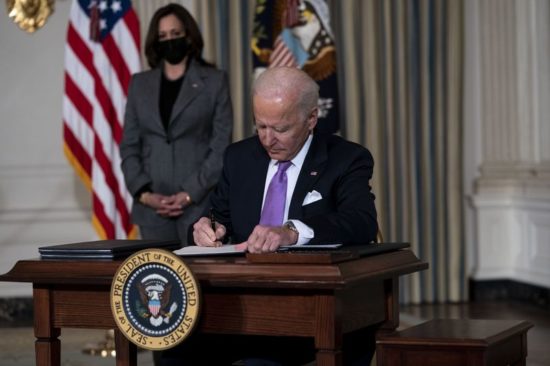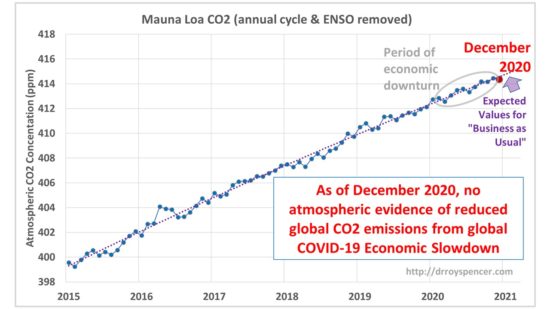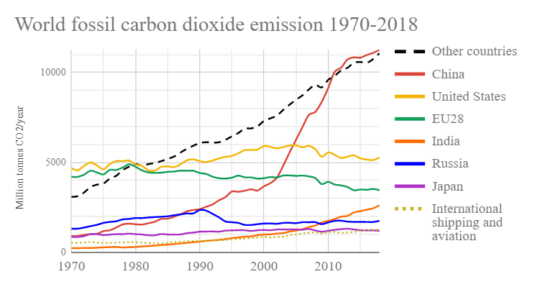
Joe Biden’s administration has made climate change one of its top priorities. Photographer: Doug Mills/The New York Times/Bloomberg
In what appears to be a never-ending string of ineffective efforts to force the public to use expensive, unreliable, intermittent, and not-widely-deployable renewable energy, the Biden Administration is issuing an executive order that (among other things) directs federal agencies to end fossil fuel subsidies.
Personally, I would not mind if all federal subsidies were ended, since all that subsidies do is put the government, rather than the consumer, in charge of what you spend your money on.
But federal subsidies on fossil fuels represent less that 3% of the revenues of the fossil fuel industry. This action will have essentially no impact on an economy that still runs on fossil fuels. That 3% will be voluntarily paid by the consumer, just directly rather than through subsidies.
In contrast, renewables currently enjoy 25 times the level of subsides per unit of energy produced as do fossil fuels, and the market penetration of EVs is still only 1.2%. One can see that massive government meddling in the energy market is the only way that people will — at least for the foreseeable future — “choose” renewables over fossil fuels.
So, while environmentalists might applaud Biden’s decision, the effect on the energy markets will be barely measurable, if at all.
You see, when it comes to global warming, modern environmentalism depends upon feelings over facts. Even if all CO2 emissions in the U.S. were to end, the impact on global temperatures by 2100 would be small. This is because the U.S. now produces less than 15% of the global total greenhouse gas emissions. The same is true if all countries abide by their commitments under the Paris Climate Agreement, which makes Biden’s rejoining that Agreement rather pointless. The effect of Paris is calculated to be a 0.2 deg. C reduction in warming by 2100, which is too small to measure over the next 80 years with temperature monitoring technologies currently in place.
Even the godfather of modern global warming alarmism, NASA’s James Hansen says the Paris Agreement is ineffective and a “fraud”, and that only massive taxation of (i.e. punishment for) using fossil fuels will make much difference.
To show just how much CO2 emissions will have to decrease to affect the atmospheric CO2 concentration, just look at what happened (or didn’t happen) last year. The U.S. Energy Information Agency (EIA) estimates that the economic downturn in 2020 produced only an 11% reduction in fossil fuel use. The resulting change in atmospheric CO2 concentration was unmeasurable:

The 11% reduction in global CO2 emissions in 2020 had no measurable impact on atmospheric CO2 concentrations at Mauna Loa, Hawaii.
Furthermore, while we nibble around the edges of the “carbon pollution” problem, China’s CO2 emissions continue to grow.

The U.S. has led the way in reducing CO2 emissions, mainly through a market-driven switch from coal to natural gas in recent years, China’s emissions continue to grow.
And while the “social cost of carbon” continues to be advanced as the justification for reducing CO2 emissions, no one wants to talk about the social benefits. For example, Nature loves the stuff. It is estimated that global agricultural productivity has increased by $3.5 Trillion from the extra CO2 in the atmosphere. It is well known that excessive cold kills far more people than excessive heat. There is no evidence that recent, modest global warming has caused a global-average increase in severe weather.
The claims by China that they will become “carbon neutral” by 2060 is just political posturing. One thing I have learned about China in recent decades is that their political culture is to say anything necessary to nominally appease other countries, and then do just the opposite if it suits their national interests. With over four times the population of the U.S., one can see why they would not want the U.S. (or any other county) dictating their behavior, especially as they continue to lift millions out of poverty.
Not unless the Biden Administration pushes for a massive increase in the taxation of fossil fuels, and then embraces either nuclear plant construction or widespread wind and solar projects to service a huge fleet of electric vehicles (currently at 1.2% of U.S. market penetration) will there be any substantial move away from fossil fuels.
Anything less will only falsely assuage fears rather than address facts.

 Home/Blog
Home/Blog



